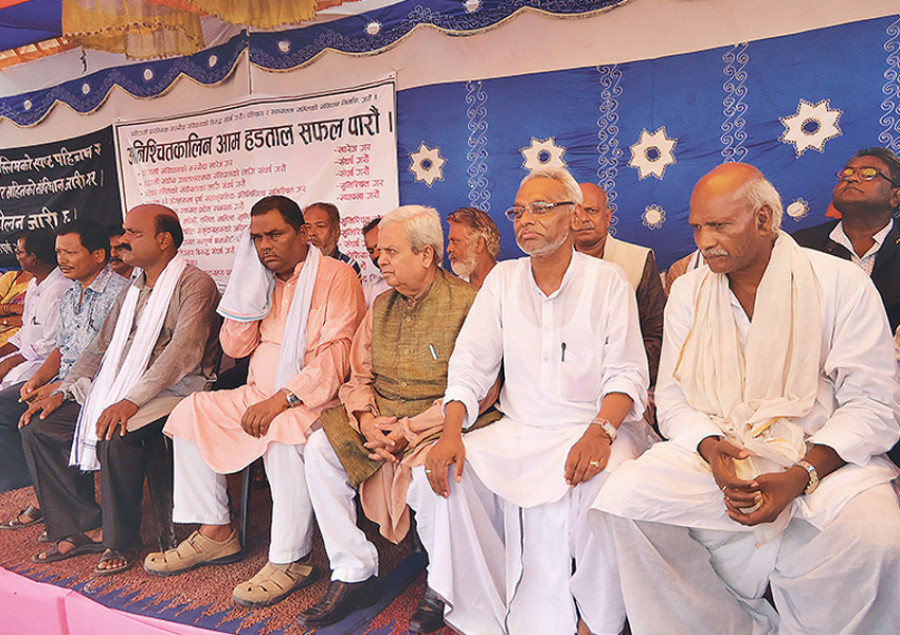Miscellaneous
Politics in Tarai ‘volatile’ as charter nears finish
A war of attrition has started in Kathmandu: whether the major parties supporting the 16-point deal will prevail or the Madhes-based parties and constituencies will force them to make major revisions
As the banda in Tarai, or parts of it, enters third week, a war of attrition has started in Kathmandu: whether the major parties supporting the 16-point deal will prevail or the Madhes-based parties and constituencies will force them to make major revisions to the constitution draft.
Two major events have taken place since the 16-point deal on June 8 as far as Tarai is concerned. One, last week, Bijaya Gachhadar, who supported the four-party deal, dissociated his party from the alliance; two, the Sadbhawana Party decided to walk out of the Constituent Assembly.
“Politics in Tarai now has entered a very volatile stage as people in the plains are feeling neglected,” said analyst Chandra Kishore Jha. “Tarai communities will not take ownership if the parties decide to promulgate the constitution without changes.”
Analysts say the draft should undergo major changes, especially on issues of citizenship and delineation of states, to take other stakeholders into confidence. Kailali and Kanchanpur have been tense ever since the four major parties decided to incorporate them into a Hill province.
Tharu communities, in support of Madhes-based parties, have been on a general strike demanding the formation of a separate Tharuhat/Tharuwan province incorporating Tarai districts from west of Chitwan to Kanchanpur. On the other hand, hill communities have been holding a similar protest, demanding a united Far West.
While top leaders of the ruling parties, including Sher Bahadur Deuba, Bhim Rawal, have stood in favour of a united Far West, leaders from Madhesi parties and Tharu lawmakers from across the party line have supported calls for the Tharuhat/Tharuwan province.
“Even Tharu lawmakers from NC and UML, among others, have lent their support to the protest after the major parties ignored our demands while addressing the demand for Karnali,” said Dhani Ram Chaudhary, chairman of Tharu Kalyankari Sabha, the organisation which is leading the protest in support of other groups.
Despite struggling to galvanise enough public support in the first few days, the ongoing protest of Madhesi parties is slowly gaining momentum in core constituencies in Madhes from east of Parsa to Saptari. Even Madhesi leaders from the ruling Nepali Congress and CPN-UML, and main the opposition UCPN (Maoist) have extended support to the protest in the wake of growing pressure from their constituencies.
With the Bijaya Gachhadhar-led Madhesi Janadhikar Forum-Loktantrik and Sarad Singh Bhandari-led National Madhesh Socialist Party joining forces, the protest will to gather steam in the coming days, said leaders of Samyukta Loktantrik Madhesi Morcha. They added that the major parties are inviting confrontation by ignoring voices of their own leaders.
“There won’t be any compromise from our side as people are with us. People will bring four parties to their knees,” said Rajendra Mahato, leader of Sadbhavana party.
Chairman of the Sanghiya Samajbadi Forum Upendra Yadav said the ongoing protest will not stop unless the major parties agree to address the past agreements.
“Federation of state based on the report of the erstwhile committee on state restructuring and devolution of state power is our bottom line. The protest will go on until that is addressed,” said Yadav.
The police killing of Rajiv Raut may have made Bhardaha in Saptari the epicenter of the ongoing protest, Madhesi activists warn of simmering discontent in other districts in the eastern Nepal.
“Its impact is seen in Saptari because of a dense settlement of Madhesi communities along the highway. This belt is also politically active than other places with Madhesi settlement,” said Tula Narayan Shah, a Madhesi activist.
However, many think the protest in this belt is gradually subsiding as most of the people are happy with the delineation, the discontent is growing in other areas.
The Madhesi parties have recently focused their protest programmes in Tarai districts west from Nawalparasi to Kapilvastu and Inaruwa to Birtamod in the east. “Since most of their demands have been addressed, I don’t think the protest will intensify from Parsa to Saptari,” said Jha.
With Gachhadar, the last bridge between the Madhes and hill parties, gone and growing disenchantment among Madhesi leaders in the major parties, including Bimalendra Nidhi, Prabhu Sah, Ram Chandra Jha, over the draft, analysts say the current chasm between the Madhes-based parties and the major parties would widen.
“The success of Madhes-based parties depends on the success of the ongoing protest. It’s still unclear what will happen,” said Shah.




 13.12°C Kathmandu
13.12°C Kathmandu









